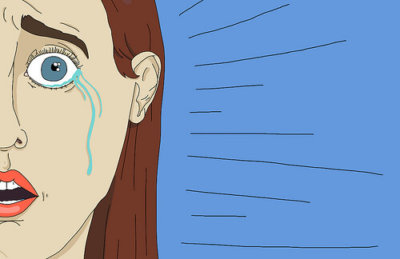Are You Overreacting? How to Tell

By: lookcatalog
by Andrea M. Darcy
It’s normal and healthy to sometimes be very emotional. Big life challenges can evoke big reactions. And we all have tired days when we can react too quickly.
But are you constantly accused of overreacting?
An overreactive personality type tends to come with marked and consistent symptoms and behaviours.
Choose the answers below that are most like you to determine if you are, or are not, the sort to overreact.
1. How do you decide what to say?
A – Often I only know what I am going to say when I hear myself saying it.
B – I tend to pause to hear my thoughts, and only say what I am pretty sure about. If I am not sure what I feel I usually ask for time to think.
2. If you listen to your thoughts, what do they sound like?
A – There are a lot of thoughts about other people and how they disappointed me, as well as some self-criticism. I often think in extremes – things are really great or really awful. I dream of how I wish things were, or remember a past that was better than my life now.
B – I do think about how things went and why, and consider the perspectives of the others involved. I’m often just thinking about what I have to deal with today, or my current situation. Or I’m making plans.
3. How quickly do you make decisions?

By: Rob Larsen
A – I make decisions on the spot based on how I feel, a past experience I have had, something the person has done in the past, or on an instinct I have.
B – I consider the facts from more than one angle, based on the current situation, and I make sure what I think is based on supported facts.
4. Is regret a feeling you often experience?
A – I feel regrets about things often, or even daily.
B – I don’t often regret things, or maybe do now and then.
5. What do you feel physically if someone is upset with you, or you think they don’t like you?
A – I feel a hot, burning feeling grow inside me. Or I feel physically weak, even shaky, or like my heart is caving in. Sometimes I feel like I have left my body even and am floating above looking down.
B – I can feel my heart beat a little, or like I have a dry mouth, but it’s not overwhelming.
6. How do you act if someone gets upset with you?
A – I tend to cry easily. Sometimes I even run out of the room as it all feels overwhelming. Or I get suddenly angry – but what do people expect if they are treating me badly?
B – I can listen to what someone is saying behind their firm tone, and sometimes even manage to ask questions and solve the conflict without needing to get upset.
7. How often are people upset with you?
A – I often have one or two conflicts on the go, or several people I am actively avoiding.
B – I sometimes have disagreements with others, butI am rarely in conflict for long with anyone. Some people don’t like me, because we have a different viewpoint, and that’s fine.
8. How often do you go over and over what you said and did in a given situation?
A -I can’t help but do this for days or weeks after a conflict. If I don’t tell all my friends, I play it out secretly in my head.
B – I might talk things through a few times with friends if there was an upsetting situation, but then I resolve it and move on.
What do my choices mean?
As you might have guessed, ‘A’ choices are signs of an overreactive personality.
Many people fall somewhere in the middle, meaning you might be sensitive, but not too overreactive. But if you tend toward ‘A’ behaviour, then yes, you have an overreactive personality.
Overreactive tendencies tend to come hand-in-hand with other behaviours and symptoms, including:
- being impulsive
- dissociation (struggling to stay present in the face of conflict)
- high sensitivity to criticism
- perfectionism
- struggling to accept the here and now
- anger management
- quick to make assumptions
- difficulty seeing other perspectives
- black and white thinking and other cognitive distortions.
An overreactive personality can also be a sign of adult ADHD as well as several personality disorders, especially borderline personality disorder, which leaves you with a thin emotional skin, and histrionic personality disorder.
Why would I be an overreactive type?
Overreacting as an adult can come from a childhood where you were not allowed to relax and be yourself. This could mean that you had a critical parent, a strict parent, or a parent who you had to take care of. A mentally unbalanced or addicted parent means a child is constantly having to walk on eggshells and be ‘good’.
All these parenting styles can lead to a child to grown into an adult who struggles with self-esteem, and is so on edge about being criticised or being hurt that they overreact to any perceived slight.
Childhood trauma can also cause an overreactive personality. Something very painful in your past, like abuse or abandonment, means you develop defence mechanisms (and overreacting is simply pushing others away) to protect you from further hurt.
It also means that you have a hidden reservoir of sadness that you can project onto present day experiences. That little insult someone else puts your way triggers years worth of pain, meaning your reaction does not match what is actually happening.
Can therapy help me stop overreacting?
Yes, it can be a big help. Cognitive behavioural therapy (CBT) is a great place to start. It is a short-term therapy that helps you recognise and control the connection between your thoughts, feelings, and behaviours. To deal with childhood trauma such as abuse, a longer term therapy like psychodynamic therapy can be a great support.
I don’t really match any of this, but my partner keeps calling me overreactive?
It’s worth looking into narcissism. If your partner suffers from narcissistic traits or narcissistic personality disorder, they are likely to blame you for being ‘overreactive’ every time you respond with reasonable upset to their bad behaviour.
How else can you start curbing your overreacting? Sign up to our blog to receive an alert when we release our connected article, “How to Stop Overreacting to Everything”.
 Andrea M. Darcy is a health and wellbeing writer as well as mentor who often writes about trauma, relationships, and ADHD. Connect with her on Instagram @am_darcy
Andrea M. Darcy is a health and wellbeing writer as well as mentor who often writes about trauma, relationships, and ADHD. Connect with her on Instagram @am_darcy






I am highly sensitive, all makes sense, I am 42 years of age, thought by now I would have learned tried all kinds of therapy, extremely anxious. My father passed away when I was 6 mths old, and to top that off have a brother of course from the same Mother who also passed away.
My mother n brother are complete opposite of me. A lot more in control of themselves. Happier calmer, where as me , complete mess emotionally. We are from Italian decent, and almost everyone I attract is a major narcissistic, so I have accumulated several of those relationships, always always felt a disconnect, most people would described as animated sexy great voice…sweet ….but I am a mess, tried medication mindfulness therapy, church healings… the reconnection by Eric pearl, cellular healing… nothing breaking easing up at all.
I had a profound energy when was younger but was always feisty defensive, just not at peace. No one seems to be able to remain consistent with me , therapy and finding that right connection has cost me a lot of dollars….
Feel helpless, but really do love your articles, to top it all off I live in Toronto Canada, I tried the mindfulness clinic, they charge $200.00 per hour , just helpless but wanted to let you all know so do love your articles , just wish I can cut a genuine break,definitely have bod sysmptons, daddy issues…
Now 42 single made a huge mistake again last year and suffering severe aftermath of narc abusive , I’m praying trying to heal ….my souls is in sooooo much pain.
My realationship history is a disaster, 3 long term ones that were devestating.
Last year again, so I am not learning healing even when I get close , it comes back around again… I feel there is no way out. I get told I don’t look my age, my insides have reversed back to childlike at times in the inside. Very draining emotionally, spiritually, mentality.
I am working still literally of the seat of my pants , just not well, my anxiety at times gets so bad I feel like I am going to die.
People family friends have tried to help, but say I have victim mentality to get over it snap out it suck it up butter cup etc…
Just exhausting I know this is long, but just had to get this out, my job is high stress as well cannot afford to just toss it aside I’m scared.
Your articles make me feel hopeful only when I am reading them, as it would be fiery difficult getting to London.
Rosanna
You know it can be very hard to be naturally sensitive and born into a family (and really, world!) that isn’t or just don’t understand you. (You might find the book Highly Sensitive People by Elaine Aron an interesting read.) What I’d say reading this is that you need to honour yourself for committing to knowing yourself. For being brave enough to spot and acknowledge your issues. That actually places you miles ahead of other people (even those who manage to portray themselves as happier, no guarantee they actually are). You are authentic, which is powerful. The path of authenticity and working to understand ourselves is never an easy one. But it really is the only way forward and even when it seems completely a waste of time, it’s a matter of keeping going. Breakthroughs do happen, often when we have given up expecting them. And you sound full of strength and courage that you don’t recognise. Try to recognise how brave you are. As for where this all comes from, it does sound that you have either long term emotional shock (look for our piece on that for more) or PTSD even. It could be from losing both parents or something else. The anxiety levels this can bring do make it hard for other therapies to have affect sometimes. Look for something that can help lower that anxiety, whether that is long term consistent work with one therapist to form a trust bond that helps you relax (from what you say Schema therapy or dialectical therapy come to mind as perhaps suitable), consistent exercise, or yes, meditation. You don’t need to pay 200, you can really learn for free. I know in Toronto there is a great Buddhist centre on Bloor West in little Korea that does donation only meditation, Shambhala? And several others, plus the Vipasana retreats in Ontario (again by donation) all take place in a really nice centre. Or try meetup.com for free meditation groups.
Why do therapists never mention about the HSP concept during therapy? I have been through years of therapy without much relief, only to read Elaine Aron’s book about HSP. It is such a relief to know I’m okay after all. If only someone had told me about it earlier, I wouldn’t have had to suffer for so long with anxiety and depression!
Hi Anna, the Aron’s book on Highly Sensitive People is indeed interesting, and some therapists do agree with some of its concepts, so saying nobody mentions it is a generalisation. We are glad the book helped you. The book has been read by us, so we do know all about it. So we are able to also say that unfortunately, the HSP idea is a theory at this time, without any solid, proper research behind it, and it is a tricky terrain. Some who read it feel relief. Others feel relief but then all symptoms come back, as they might be sensitive, but they also might have old traumas that need proper processing, not just to be hidden behind the “HSP” label. And finally, it’s a tricky terrain as it can be something those with BPD use as an identity which means they never seek real help and never break out of the behavioural patterns that see them constantly lonely and misunderstood, which to us is a great tragedy, as BPD is highly treatable with schema therapy and dialectical therapy.
Hey Rosanna, I hope by this time, you’re doing great. If you need an anonymous friend like I do, email me whenever. It’s really nice to know you’re not alone. Alone with this growing sadness, we’ve been trying to hide and forget. (**note from editor – Laura’s email won’t show but Rosanna, if you comment again, we can get in touch to connect you both).
I have taught part-time for nine years at a school where most teachers have held long-term full-time positions; they opened the school together 17 years ago and have worked together ever since. This last year two of us have been teaching full-time remote in temporary positions due to the Pandemic. Recently, this other teacher (who is a beautiful and deserving person) posted photos of a card sent to her, signed by the teachers we worked with and will again, wishing her well and telling her how much she is missed. The sharing of his card on Facebook is not the issue and for her to share was a natural thing to do. What I can’t seem to understand is the lack of acknowledgment by my fellow teachers. I find that I am unreasonably sad over this slight by my coworkers.
Hi Patti, we don’t know the whole story, for example, was it her birthday, or a major life event? Was there another factor that led to the card being sent? But regardless, honour yourself for this bravery and this self awareness. Jealousy is human. Especially if we are working really hard for something and hope for recognition for our efforts. We don’t know you, we can’t offer counselling via comments. But we’d say that there could be logical things here. It could be a red flag there are things you aren’t comfortable with about this job that have been going on for too long that you need to address in a calm, clear way with colleagues. And it’s about gathering your courage and having those conversations. It could on the other hand be that this is a pattern, that you often feel underrated and overlooked, that it’s not really about this job and that this goes back to your childhood and needs addressing such as by working with a therapist. Best, HT.